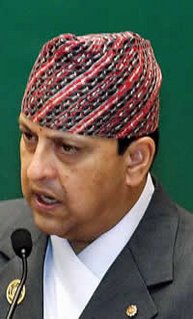 With the Maoists now fully and formally part of the political mainstream, it’s time to recognize that single seminal event that made all this happen: King Gyanendra’s February 1 2005 takeover.
With the Maoists now fully and formally part of the political mainstream, it’s time to recognize that single seminal event that made all this happen: King Gyanendra’s February 1 2005 takeover.Without the much-maligned palace intervention, the external dynamics impeding the resolution of the conflict would not have dramatically changed course. For far too long, India actively continued sponsoring the insurgents while retaining the plausible deniability associated with having officially describing them as terrorists. A perpetually weak Nepali state, after all, was best responsive to Indian pressures.
The months preceding the takeover were ominous. Prachanda only wanted to talk with the king. New Delhi seemed ready to let the monarch take direct control as long as its unspecified – yet barely disguised – interests were addressed.
The eventual takeover didn’t come in the form India had expected. Yet the perceived pro-Chinese nature of the development didn’t prevent India from demanding concessions from the royal regime. Acquiescence wouldn’t have solved the underlying crisis. The palace upped the stakes.
China’s formal arrival in South Asia as an observer to the premier regional body in November 2005 forced India to begin shedding its sham. Forging the SPA-Maoist alliance wasn’t too hard once the principal objective became an imperative. The details of the emerging order could fall in place as events unfolded.
When the combined anti-palace front resulted in the supply of Chinese military supplies, New Delhi detected the danger inherent in its policy of deception. The upsurge in public protests was inevitable. The world was waiting for King Gyanendra to board that helicopter into exile. He happened to be that rare Nepali who knew the Maoists had come as far as their New Delhi mandate had permitted. The restoration of parliament gave the rebels the largest fig leaf.
After swearing in Prime Minister Girija Prasad Koirala, the monarch, citing the Nepali Congress president’s non-cooperation during the preceding three and a half years, pledged his support to the new order. Now it was the SPA-Maoist combine’s turn to deliver.
For Prachanda, the Madan Bhandari moral remained uppermost. The rebel leader’s consistently profuse praise for India was merely a survival strategy. His anti-Pakistan tirade was gratuitous but it offered New Delhi an insurance policy against future mischief.
And mischief is what India is truly worried about, considering the convulsions the Maoists’ rise has sent across the ideological spectrum there. For a while, Indians were gloating at the way the Chinese had ditched the palace. If that’s really what Beijing had done, then the Chinese must have found someone else to bet on.
Officially, Beijing remains characteristically quiet on developments in Nepal. Academics and media professionals reflecting the official position have been quite candid about how ideologically proximate Beijing is to the Maoists. With the Maoists having renounced violence, the Chinese are reminding us how they had never called the anti-government guerrillas terrorists.
As for the platform of nationalism the Indians had though they had succeeded in denigrating as a palace ploy to bolster autocracy, well, listen to those sonorous Maoist tapes. Don’t they revive every bit of the Panchayat-era patriotic fervor on Radio Nepal minus the references to the monarchy?
By seizing direct control, King Gyanendra knew he was risking his throne. The monarchy may have lost the gamble, but the country hasn’t. The United Nations’ arrival as part of the peace process has ended New Delhi’s monopoly in its tiny northern neighbor.
The United States may seem to have lost ground to India and China in the current dispensation. Yet both New Delhi and Beijing recognize the deep footprints the world’s third most populous nation has sunk in that narrow sliver between the first and second.
The profound ground realists they appear to be, the Maoists probably realize the room for maneuver this gives Nepal.
Who knows, Dr. Baburam Bhattarai might even one day include King Gyanendra in that list of monarchs whose patriotic works the Nepali people will always evaluate highly.